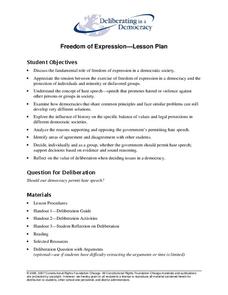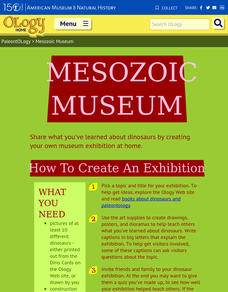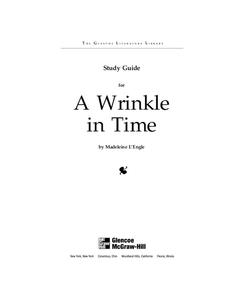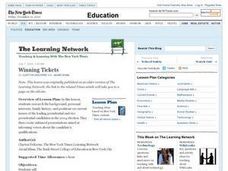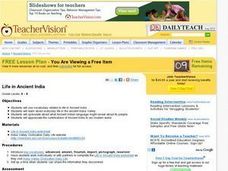Education World
Every Day Edit - Ederle Swims English Channel
In this everyday editing instructional activity learners correct grammatical mistakes in a short paragraph about the first woman to swim the English Channel. The errors range from punctuation, capitalization, spelling, and grammar.
Penguin Books
A Teacher's Guide to the Signet Classics Edition of William Shakespeare's Henry V
Henry V is certainly not a drama "of few words." It's a sprawling study of a good yet complex king, a tumultuous time in European history, and an examination of justice and mercy. The 20-page guide to the play provides instructors...
Curated OER
Introduction to Age of Absolutism
Who were the absolute monarchs of Europe and what effect did they have on their countries? Young historians begin by naming qualities they believe are important for a monarch to possess. They then take notes on four key factors...
Deliberating in a Democracy
Freedom of Expression
Should democracies include hate speech as a protected right? Scholars analyze the rights found under the First Amendment to the Constitution through researching evidence. Freedom of expression becomes the focal point of the...
American Museum of Natural History
Mesozoic Museum
Mini museum curators create an exhibit that showcases the Mesozoic era. Pupils use their knowledge of dinosaurs to make informative posters, drawings, and dioramas. Following three steps to complete the hands-on activity, scholars read...
Teacher Printables
My Report Pack for. . .
Here is a handy guide for putting together a research report on birds, or on a selection of other topics (see the added materials.). Individuals are guided to think of three questions about their topic, they narrow down subtopics, use a...
McGraw Hill
Study Guide for A Wrinkle in Time
Mrs. Who, Mrs. Whatsit, and Mrs. Which would not be so confused if they had a study guide as great as this. Scholars increase their comprehension of A Wrinkle In Time through many supports such as guided questions, background...
ProCon
Minimum Wage
The first ever minimum wage in America was set at 25 cents per hour in 1938 and has been steadily, if slowly, increasing ever since. Using the provided website, pupils decide if the United States should further increase the federal...
American Museum of Natural History
Create a Coral Reef
Scholars create a diorama to showcase a vibrant coral reef. Six steps walk pupils through setting up the diorama box, crafting four different types of marine life, and putting it all together.
Anti-Defamation League
Emojis and Me
A lesson features the work of O'Plérou Grebet, a graphic designer who created a collection of emojis to represent his life in West Africa. Scholars explore the history and purpose of emojis, then read and discuss an article about...
Curated OER
What's the Context Worksheet
What is context? The class researches a family treasure carefully for its hidden significance as well as its obvious story. They interview family members to gain more insight and context clues to determine point of view and meaning...
Curated OER
Food and Culture: Exploring the Flavors of Your Community
Students brainstorm the types of food they eat at home, discussing and comparing with the class. Students brainstorm and make a chart of questions that came out of the activity and their discussions. Students interview someone who...
Curated OER
Pioneering Spirits: A Personalized History of Our Jewish Community
Students travel in groups to various stations to discover the history of the Jewish community. At each station, they read primary source documents about the history of their community and research their own family history. They mix...
Curated OER
ABC...Have Fun With Me!
Throw out those old ABC worksheets and try some new and engaging hands-on activities to teaching the alphabet!
Curated OER
Tell a Totem Story
Students study and view pictures of Native American totem poles on the internet. They create totem poles using PowerPoint that represent their family histories using symbols to designate historic events.
Education World
Every-Day Edit: Alexander Graham Bell
In this everyday editing instructional activity, learners correct grammatical mistakes in a short paragraph about Alexander Graham Bell. The 10 errors range from capitalization, punctuation, spelling, and grammar.
Education World
Every-Day Edit: Alaska, the 49th State
For this editing activity, students read and edit a short passage entitled, "Alaska, the 49th State." Students look for 10 errors in capitalization, punctuation, spelling and/or grammar.
Education World
Every-Day Edits: Ellis Island
In this proof reading instructional activity, learners read a paragraph about Ellis Island. Students locate and correct 10 errors in the paragraph.
Curated OER
Winning Tickets
Students research background, personal interests, family history, and positions on current issues of the leading presidential and vice presidential candidates. They create unbiased presentations aimed at informing voters about...
Education World
Every-Day Edits: Betsy Ross
For this proof reading instructional activity, students find ten errors in a paragraph about Betsy Ross. They correct the errors using standard editing symbols.
PBS
Women's History: Clara Barton
Students investigate Clara Barton's contributions to society. In this Clara Barton lesson plan, students watch videos, listen to lectures, and conduct research regarding Clara Barton's life and her possible authorship of a Civil War...
Curated OER
History and culture through food
Students select a favorite family recipe and research the recipe and its ingredients using a variety of sources on the Internet. Each student then creates a recipe flyer for a class cookbook that includes their recipe and the historical...
Curated OER
Life in Ancient India
Students study Ancient India and the vocabulary, language, and everyday life associated with India. They build a time capsule representing their own world for future civilizations to discover. They create labels for each item, giving a...
Curated OER
Preserving History
Middle schoolers discuss how writing is an important historical tool. They read writings from individuals and note how they have preserved history. They describe what those stories say about the communites they came from.



